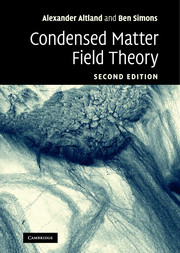Book contents
- Frontmatter
- Contents
- Preface
- 1 From particles to fields
- 2 Second quantization
- 3 Feynman path integral
- 4 Functional field integral
- 5 Perturbation theory
- 6 Broken symmetry and collective phenomena
- 7 Response functions
- 8 The renormalization group
- 9 Topology
- 10 Nonequilibrium (classical)
- 11 Nonequilibrium (quantum)
- Index
9 - Topology
Published online by Cambridge University Press: 04 August 2010
- Frontmatter
- Contents
- Preface
- 1 From particles to fields
- 2 Second quantization
- 3 Feynman path integral
- 4 Functional field integral
- 5 Perturbation theory
- 6 Broken symmetry and collective phenomena
- 7 Response functions
- 8 The renormalization group
- 9 Topology
- 10 Nonequilibrium (classical)
- 11 Nonequilibrium (quantum)
- Index
Summary
x In this chapter we discuss low-energy theories with non-trivial forms of long-range order. We learn how to detect the presence of topologically non-trivial structures, and to understand their physical consequences. Topological terms (θ-terms, Wess–Zumino terms, and Chern–Simons terms) are introduced as contributions to the action, affecting the behavior of low-energy field theories through the topology of the underlying field configurations. Applications discussed in this chapter include persistent currents, quantum spin chains, and the quantum Hall effects.
In the preceding chapters we encountered a wide range of long-range orders, or, to put it more technically, different types of mean–fields. Reflecting the feature of (average) translational invariance, the large majority of these mean-fields turned out to be spatially homogeneous. However, there have also been a number of exceptions: under certain conditions, mean-field configurations with long-range spatial textures are likely to form. One mechanism driving the formation of inhomogeneities is the perpetual competition of energy and entropy: being in conflict with the (average) translational invariance of extended systems, a spatially non-uniform mean-field is energetically costly. On the other hand, this very “disadvantage” implies a state of lowered degree of order, or higher entropy. (Remember, for example, instanton formation in the quantum double well: although energetically unfavorable, once it has been created it can occur at any “time,” which brings about a huge entropic factor.) It then depends on the spatio-temporal extension of the system whether or not an entropic proliferation of mean-field textures is favorable.
- Type
- Chapter
- Information
- Condensed Matter Field Theory , pp. 496 - 601Publisher: Cambridge University PressPrint publication year: 2010



